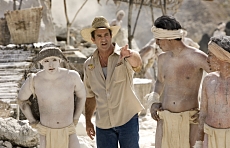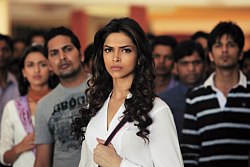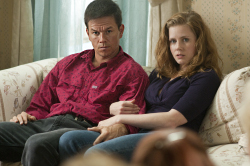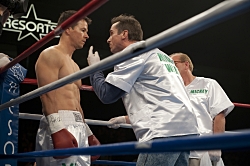How long has Apocalypto taken?
Popular on LondonNet
We started writing this two and a half years ago. The time editing has been insane because the post production time was extremely abbreviated.
Due to the fact that the film was a very difficult one to shoot and it went four months over schedule. It really curtailed our post time and we had to edit fast and mix in half the time but I think we did a really good job.
How tough was it to film in the rain forest?
There’s a guy down there who looks like a Mexican John Malkovich who’s decided to keep his land pristine. He left all the trees alone and it is beautiful. Unfortunately much of the rain forest in Southern Mexico has gone but this guy at least has kept a chunk of it. It is only about 50 acres. So down there you are kind of away from things a little bit and you are dealing with a film that is always moving. The shots are moving and the people are moving in the shots. Many of the cast had not ever been in front of a camera before and they had to learn how to be film actors, and they were very good. They just trusted, which was really nice. The really good thing about using people who are really green – who have never done anything before – is that you don’t have to erase a bunch of bad habits and then put good ones in. You can just start feeding them good habits. This was the case here. It took a little while but then they got in the swing of it. By the time we were finished they were just doing stuff automatically. They were being paid to go to school for eight months, so it was good. It was good for me too, because they were fresh and enthusiastic.
How did you keep up your enthusiasm and energy levels for eight months?
Well it was difficult at times. You can get pretty cranky and it just seems to be like an on going thing…when is this going to end!
But when we conceived this story there was a real passion involved in telling a really compelling story and then having all these very subtle things hidden, all the way along. The story is actually very simple, with a very straightforward through line, but the meat that attached to the bones of it is quite complex. There are messages about civilisations and we are trying to be true to history as much as possible. We wanted all this to gel with some good theory about why these civilisations went down, why they weakened and crumbled. Because they did, they vanished.
At times isn’t the film almost Biblical?
It is Biblical. If you just read Joseph Campbell who has written amazing books on mythology, religion and they all do come together at some point. There are some of the greatest stories that there have ever been in the Bible. All you have to do is read the book of Maccabi, it’s like a film script. You can access that on many levels and the human spirit and the human mind responds to those themes because they recognise the veracity of them. That they are real things. Sometimes it even goes beyond logic, it is just a sense of something.
There is an old film about the Mayans, called Kings Of The Sun, that starred Yul Brynner and George Chakiris.
I saw that. That was ages ago and they were all walking around with tea towels on and posturing a lot, flexing their pecs.
In your film the priests talk about becoming nearest to the gods.
That was what it was all about, they were all looking for a higher experience. That is why they built those pyramid things… like a Tower of Babel or something.
What research did you do?
There was a really good book by Diego De Landa who was a Franciscan and his was a first hand eye witness account of the customs, the mores.
He saw the human sacrifices happen. He was also responsible I think for leaving the code breaker. He looked at the hieroglyphs and taught some guy Spanish and got him to translate, so there was a record of that which they did not really find until after the Second world war,
because it was lost behind the Iron Curtain.
This could be the sort of film that makes people want to find out more about this time in history?
I hope so, they are finding out more every day. That’s the amazing thing. We employed the help of Richard Hansen, who was a professor at UCLA and is now at the University of Idaho, who deals with an even older period of Mayan history. We went to the places and stood at the top of the pyramids to see the footprint of the sophistication that once was. It is just staggering, it’s like Manhattan. You have the biggest pyramid in the world there, bigger than the ones in Egypt.
Massive things from which you can look around and see the outlines of all these cities with roads all coming to the middle. They had a sense of balance, everything had its right place, it was all married up to the firmament. They knew all about the stars and the sun and the moon and their movements. They had a very complex calendar, more complicated than ours, by far. They knew so much. They were a very sophisticated society that was pretty savage too.
You don’t shirk from showing the savagery because they don’t see themselves as savages. They see what they are doing – human sacrifice – as keeping them in touch with their god.
That’s right. That’s what I told the actors when they were all doing it. I said you are not bad guys, I don’t ever want you to think that you are a bad guy. You are a part of your culture and you are doing your job and that’s what you do. That’s all you know and all you were raised to do. You are not saying…I’m a villain!….and twirling your moustache. You are doing the right thing and if somebody knocks your son off you go and hunt them down.
After the chief’s son is killed you almost feel sorry for him and his loss.
Yeah you do and you should. He has the function of being ‘the villain’ right, But a good villain has dimension or dementia. But even the other guy – who taunts Jaguar Paw and prods the captive’s wound – although he is sadistic and he did more of the usual villainous things but even he had moments. I wanted the audience to look at him and understand him somehow.
 Can we draw comparisons between your making of this film and The Passion Of The Christ?
Can we draw comparisons between your making of this film and The Passion Of The Christ?
A lot of the same sensibilities go into them. I think you move on but there are certain rhythms that are yours and so you leave your mark on something. There are certain things that I will do viscerally to affect people emotionally, with speed changes and sound, and various other things. Sure there are links; the same kind of sensibilities went into it and I worked on writing that script as well so there was an emphasis on a minimalisation of dialogue as far as possible, to focus on the visual and to put it in another language, of course.
This film would sound crude if it was made in English.
That’s right. It used to ruin films for me when I was a kid. I’d watch a really cool idea and then they’d come out with really corny lines and I’d go…oh, com on! It would destroy the whole image for me.
All of a sudden it has gone. It’s like a scene when the Vikings are going to ransack a convent and kill everybody. The guy gets off the boat and he’ll say something like…I have the axe of my forefathers here. All of a sudden you think…ok, he’s from East Los Angeles.
But he could utter the very same phrase in low, guttural German and you might have to read it, but my god, it would frighten you. He is supposed to be scary and it is the same with these guys in this film.
It must give you tremendous satisfaction when you can make a film that is out of the mainstream and the mainstream audience goes – like with The Passion Of The Christ – and you prove the doubters wrong?
Well I hope they go. But the point is not really about being vindicated but it is about doing the things you want to do, in the way that you want to do them So that you achieve a certain amount of independence by being indeed, in every way, independent and not having any sort of interference. You can just go about making your table…I’ll chip this off here, and put a leg on here and it’ll be this high….without too many cooks. So that’s good. But nobody makes art for an elite, not if they are a real artist. You try and reach as many people as possible with whatever it is that you make. If a chef is making an omelette he wants everyone to think that it tastes great because he did it. And if it does, then that’s a success because everyone eats it. I hope this story finds them and touches them and they find access to it and the characters. That was a primary thing, right off the bat. You are going way back, into another culture, with a different language and they look really different, they are all brown, the cast is entirely indigenous.
And they all look individual, you’re never confused about who’s who.
A lot of hard work went into that.
What was the weather like during filming?
We went there in the dry season, because we didn’t want any rain…for obvious reasons. And of course we were in a RAIN FOREST and so it rained. They said that it never happens at that time of year. It was odd that it was raining a lot, they said. But it did shut us down.
I’d say we lost at least a good month because of rain.
And working in strength sapping heat?
One adapts to the conditions after a while. It takes a little while, it is debilitating at first, and then you just walk through it. You get used to sweating. Sometimes like in that city scene it was sweltering.
The hottest scene in the whole film is when the captives are hanging off the cliff top. That was just brutal, it was like an oven. I’d go up there and the heat was bouncing off the rock face. It was 135 degrees.
You can see it in the faces of the actors, when a native is pushed off the cliff you can see beads of sweat running down the bad guy’s face.
Man, it was hotter than hell in there. I’d go up there and be talking to them and just about be passing out. At least the flies weren’t bugging us that day. Even they had to go into the shade, it was so hot.
Did you need special people to keep your cast and crew safe from bugs and jungle creatures?
Yeah we had snake wranglers around. If you step on a Ferdelance you are in trouble. That’s the highly poisonous snake that bites the Mayan in the neck in the film. We had to be careful about snakes, bugs and ticks. Then of course there are the injuries. It was kind of rough terrain. But the reason we chose to film in Mexico was that you could have primary rain forest and you could also have some flat ground that you could work on.
You have never made an easy film. Was this the toughest?
This was the hardest…by far. The schedule turned out to be longer than anything else, some of the things turned out to be really difficult to achieve because you were working with animals…jaguars, tapirs, snakes, monkeys. I can’t even remember all the animals. The peccaries were nasty.
With all this on your neck how did you switch off at night when you finally got to your accommodation?
You are already switched off when you get there. It didn’t take anything at the end of the day when you got in the car and after 15 minutes drive be snoring from sheer exhaustion. The worst debilitating thing was when we all got a case of what I like to call ‘gringo gut’.
You are not used to the little visitors. You eventually get more used to them, the local people have a natural immunity. But when you first go down there and eat a tortilla, it hits your stomach and there are things you didn’t bargain for.
Were there days when you were too ill to work?
A couple of days I got like that, the rest of the time you just work through it, but you loose a lot of weight.
 You create a spectacular Mayan city with a mob of people. How many extras were used?
You create a spectacular Mayan city with a mob of people. How many extras were used?
We had at the largest count about 850 extras and in some scenes we had to multiple their numbers. The extras were amazing. The people of Vera Cruz were amazing. They don’t complain. It was hotter than hell and they were not complaining; they were working really hard and for long hours. They had to get up very early because even the extras had to have elaborate make-up and wardrobe. We had 300 make-up artists whose start up time was a quarter past midnight to get ready in the morning. So it was a very grueling shoot for everyone, the make up people, the actors. They would get off work and sleep for about five hours and then get going again. We had a place for them to sit and rest and often they’d just be snoring away during the day. They often sat there sleeping during the make up sessions. We went down there early which gave me the opportunity to audition the crew, the Mexican guys down there. In a lot of cases you will take a lot of your own guys but I realised that the crews down there are high calibre and so this is really like a Mexican movie. There is a huge talent pool down there.
How did you cast your two leading men?
We found them through a long process. I looked at a lot of people. I put out a call and we went from Canada, California, New Mexico to Oklahoma. I wanted to see native peoples and we found them from everywhere. The little girl for instance that we found, she doesn’t speak anything else but Mayan. That is her only language. She comes from a village that is less sophisticated than the village we showed you in the film. That’s the way she still lives, in the forest, in huts with dirt floors. She was seven years old and had never seen a camera or a car before. When we initially went to the casting people in Mexico they sent all the European looking actors but I wanted the Indian looking ones with the high cheek bones.
Was this the first time you had worked on a movie where a lot of the people didn’t know who you are?
But they weren’t all like that. Certainly the little girl from the village had no idea. But in Mexico there is an obsession with Mad Max.
We are going to show them the movie. We will go down there and give them a good old look, I think they will be amazed. They certainly earned every bit of kudos.
Were the actors aware of how physically demanding this was going to be?
They knew going in. I told them what it was going to be like. It’s about the most physical film that I have ever seen as far as sheer endurance is concerned…eight months of that stuff! How do you keep a guy from breaking a leg? And nobody was hurt. I got them down there a good bit beforehand and told them they were looking a bit flabby. I said they were good and I knew they had it in them but they had to go on a diet that made them look as though they lived back then. So they started to eat the right kind of food and got really lean and muscular.
I got them to exercise to keep their ankles and ligaments strong. So they trained for six weeks in pre-production. We had a movement coach who made them all graceful. It was good for them because a lot of them had never been in any kind of performance before. The coach started to knock the 20th century out of them.
The waterfall leap has to be CGI?
Well you can’t go off that waterfall without dying. So we jumped off a building that was the same height. He was filmed doing that and the side of the building was painted grey. So he did make the jump but not over the waterfall because you just don’t come out of that. But he did go through the quicksand. We dug a hole and made the mud…a little chocolate pudding with gravel.
Was there any moment when you thought you had bitten off more than you could chew?
Of course! It scares the hell out of you! The amount of work, the logistical nightmare. But I had been through those kinds of things before, so I knew it was possible. But I was looking at it and thinking…I don’t know how we are going to get this. Sometimes you got to a point where it was not happening and you had to figure out another way to do it. It was really hard, particularly to make the jaguar do what you want. That was not CG, it is real guy had to run really fast and not trip and there is a form of restraint on the creature that you can’t see. It was all very safe. But it is real.
Time off now?
Yeah you need a little time to decompress, recuperate and regenerate and start cooking on some other idea. The next film will be in the English language…for a change. I don’t know if I can do it. (laughs)
What about acting again?
Well I am not desperate to jump in front of the camera. If something really good comes along and it is opportune and I really like it, then I will be there in a heart beat. But I enjoy doing this too much, it is more fun.








